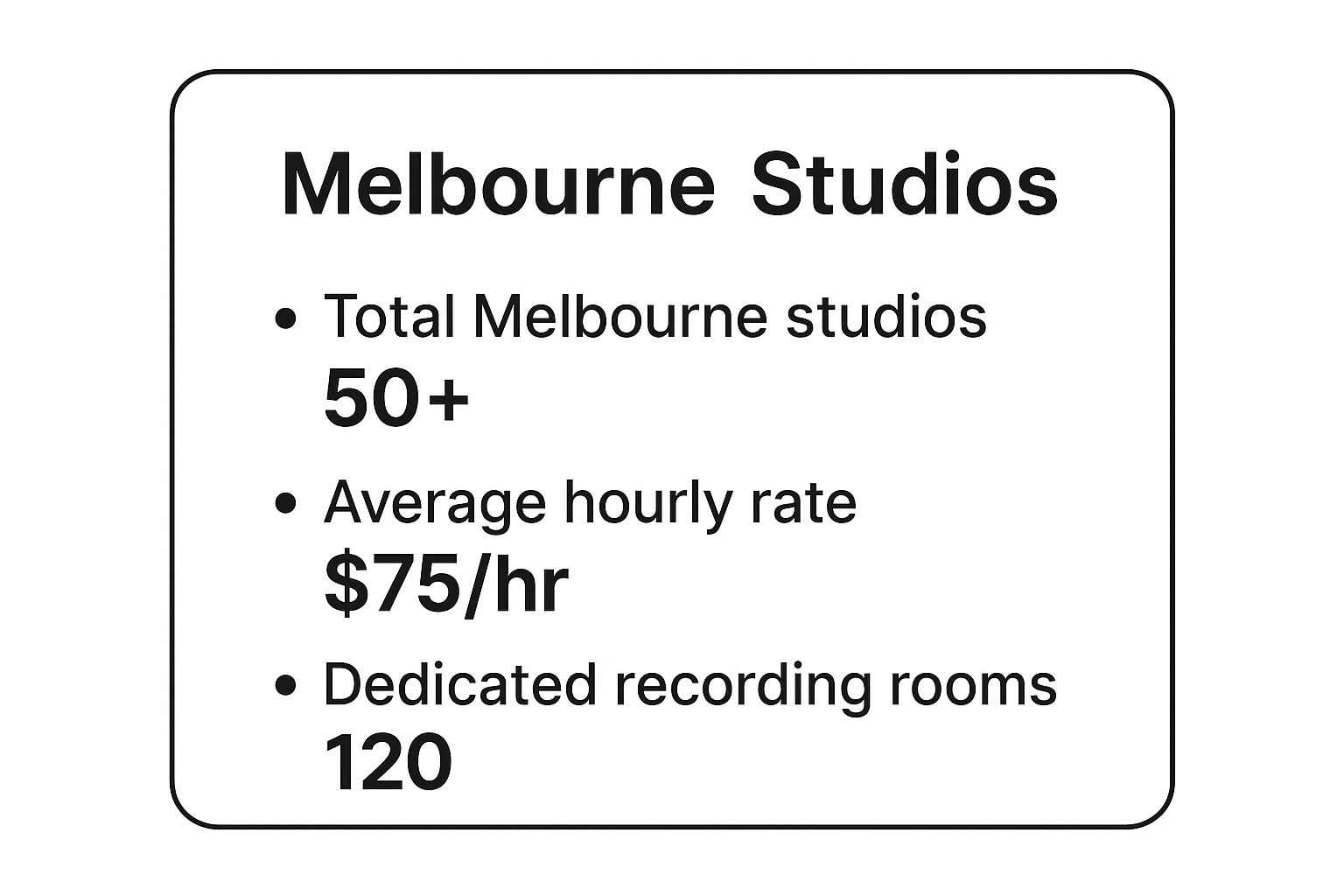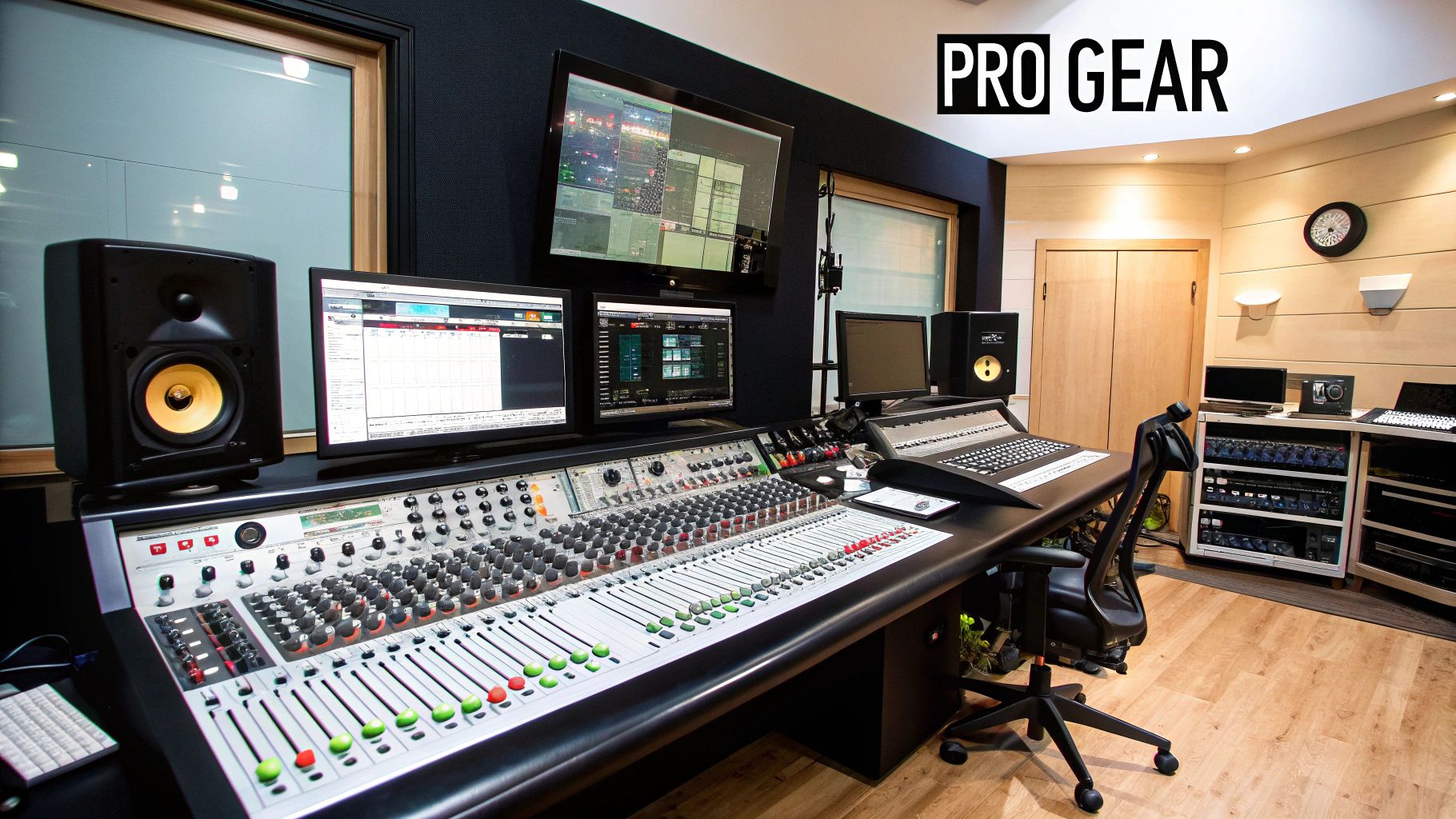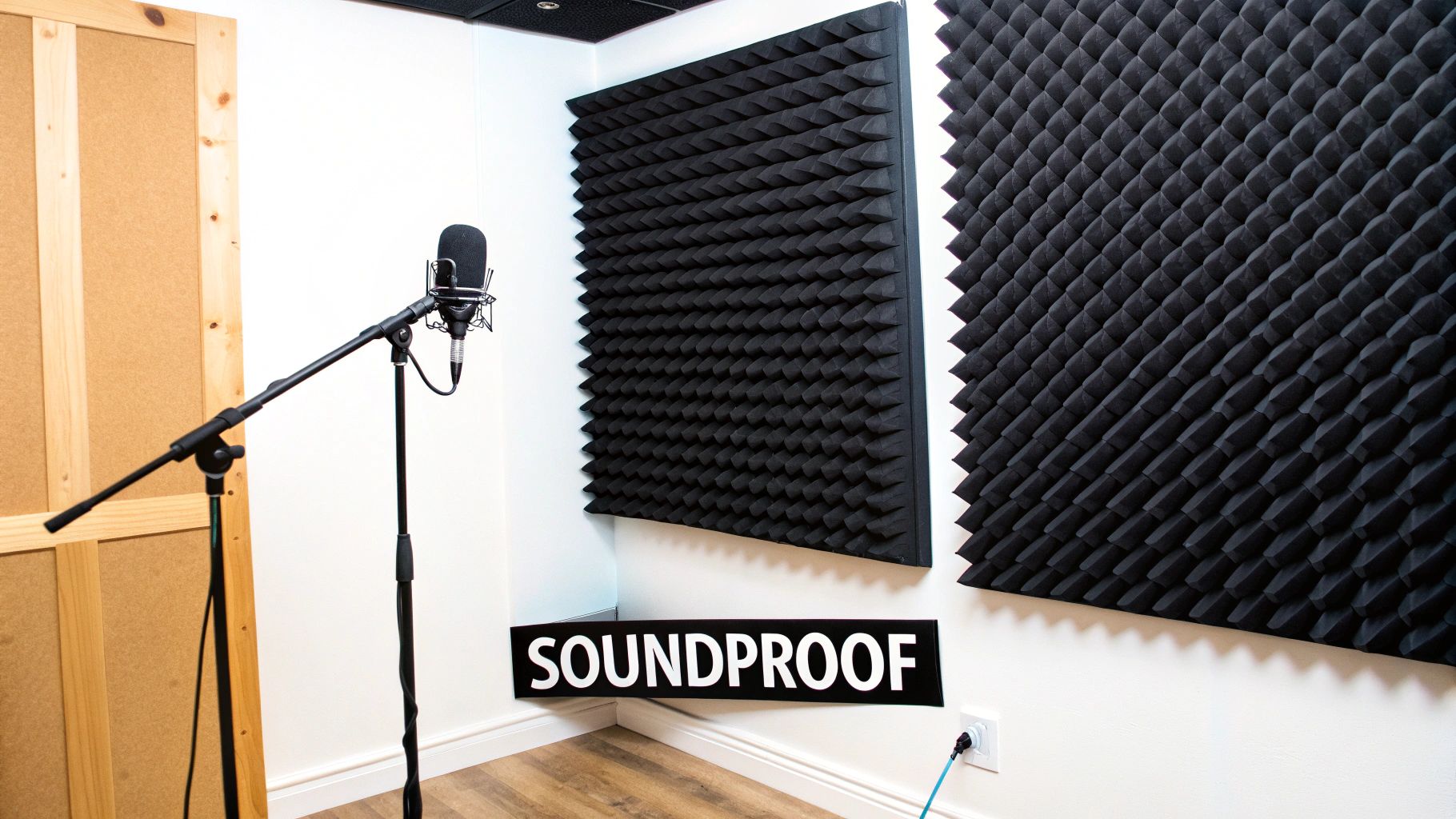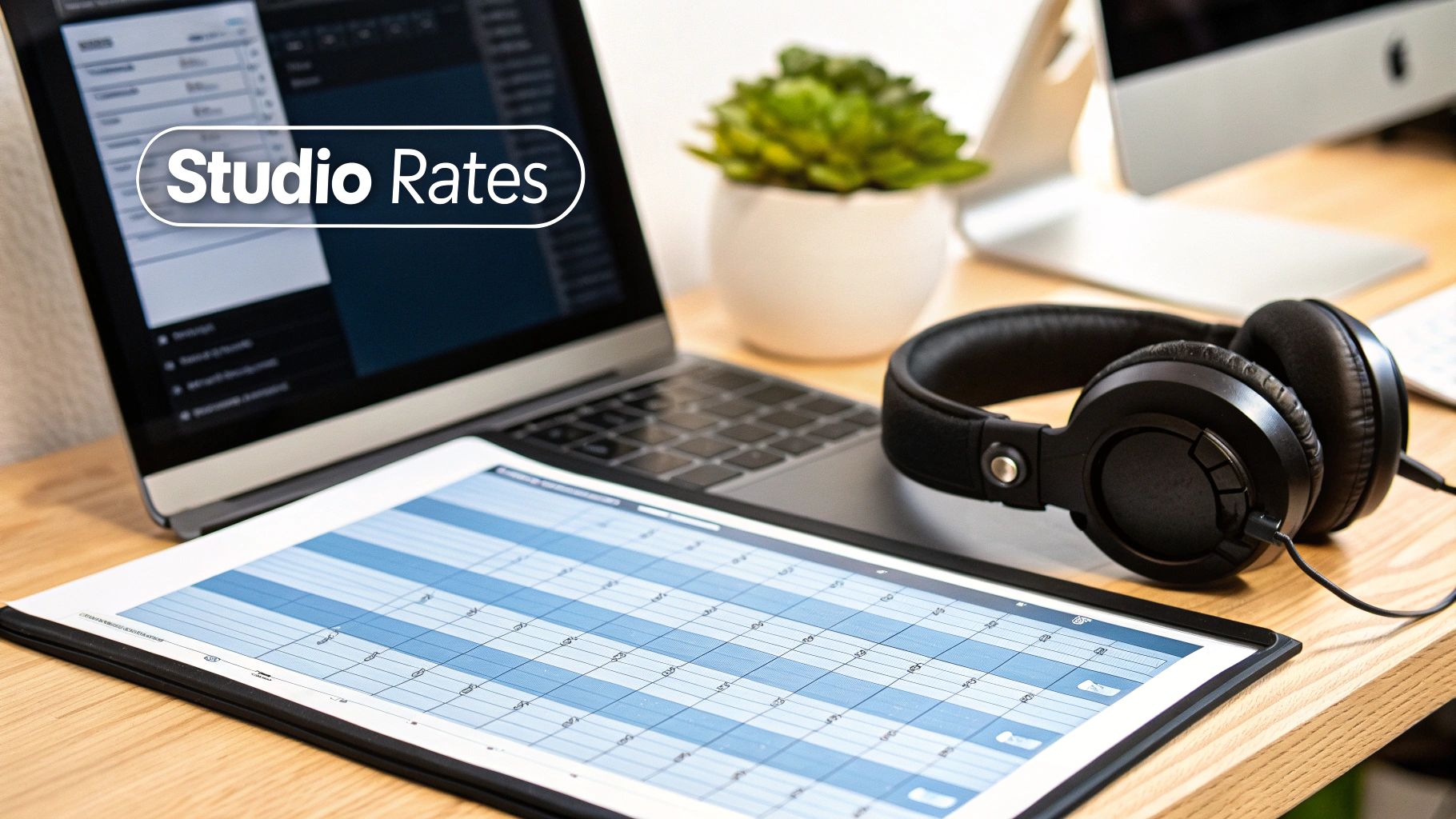A Guide to Music Recording Studio Melbourne Sessions
- contact733797
- Sep 3, 2025
- 12 min read
Melbourne's music scene is buzzing, and its recording studios are just as diverse. You'll find everything from tiny, specialised vocal booths to massive live rooms. With over 50+ locations to choose from and an average rate hovering around $75 per hour, there’s a perfect spot for your sound and your budget.
Choosing the Right Music Recording Studio in Melbourne
The first step in finding the right studio is a reality check: what does your project actually need? A five-piece rock band needs a completely different space than a solo vocalist or a podcast host. Don't be shy—ask for gear lists and room dimensions right from the start.
A small home studio might offer a great flat rate for a straightforward demo, but a multi-room facility like Empire Music Studios provides incredible acoustic variety for more complex projects.
Speaking of which, Empire is a great example of a top-tier Melbourne space. With over 35 years of industry experience behind it, the studio covers a massive 1250 square metres. It boasts four unique studios and even a live stage that can seat 120 guests. You can get a closer look at what they offer in this Mixdown Magazine studio profile.
When you're comparing studios, keep these things in mind:
The Gear: Does the studio’s console, microphone locker, and outboard gear line up with the sound you're chasing? Check for compatibility.
The Room Sound: A well-treated room with good acoustic absorption is your best friend for controlling reverb and unwanted reflections.
The People: Having an experienced in-house engineer on hand can be a lifesaver, speeding up everything from setup to getting the perfect take.
"Choosing a studio isn’t just about gear; it’s about the vibe and workflow." – Producer Alex Rowan
Nailing Down Your Shortlist
Once you’ve got a few potential studios in your sights, it’s time to get a feel for them. If you can, book a visit. If not, a virtual tour is the next best thing. Pay attention to the atmosphere and how the staff interact with you. This is your chance to poke your head into the isolation booths and maybe even do a quick test with a mic.
Taking this extra step can save you from nasty surprises on recording day, which ultimately saves you time and money.
Here's a quick look at Melbourne's studio landscape, based on data from over 50 local spots:

What does this tell us? With around 120 dedicated recording rooms across the city, you have plenty of options. It means that even with a bit of short notice, you can often find and book a high-quality space without too much stress.
Melbourne Studio Types at a Glance
Not all studios are created equal. This table breaks down the common types you'll find around Melbourne to help you figure out what's right for you.
Studio Type | Best For | Key Features | Typical Budget |
|---|---|---|---|
Large-Format Rooms | Live bands and ensembles | Multiple isolated booths, live stage, extensive mic collection | $150–$300 per hour |
Project Studios | Solo artists and demos | Compact booths, quality preamps, essential outboard gear | $50–$100 per hour |
Boutique Vocal Booth | Voice-overs and vocals | High-end preamps, specialised vocal mics, pop filters | $75–$125 per hour |
When you're making your final call, be realistic about your budget versus the features you truly need. A massive, multi-room facility is impressive, but if you're just tracking solo vocals, it might be an expensive overkill.
For more tips on finding the perfect space, check out Your Guide to Music Studio Hire for Flawless Tracks.
A Real-World Example
Think about it this way: I know a local folk duo who were tracking at a large, expensive studio out in the suburbs. They realised they were paying for a huge live room they simply weren't using.
They switched to a smaller, more intimate studio with a great vocal booth in the inner city. The result? They cut their recording costs by 30% and got a warmer, more focused sound that suited their music even better. It’s all about matching the space to the project.
So, You're Ready to Book the Studio? Here's How to Nail It

You've done the research and have a shortlist of studios that feel right. Great. Now comes the part where you lock it in without any last-minute drama. Your first email or phone call isn't just a booking request; it's the beginning of a professional relationship. Getting it right from the start sets the tone for your whole project.
When you make contact, have a clear, concise summary of your project ready to go. "I want to record a song" is way too vague. Instead, get specific. Are you tracking a full four-piece band live off the floor? Is it just you laying down vocals over a pre-made beat? Maybe it's a delicate string quartet session. The details matter.
It also helps to have a few potential dates in mind, and a bit of flexibility will always be appreciated. If you have any non-negotiable technical requirements, like a specific Neumann U 87 for your vocals or the need for a real grand piano, bring this up immediately. This is basically your technical rider, and it makes sure the studio can actually accommodate you when you walk through the door.
Don't Sign Anything Until You've Asked These Questions
Before you even think about putting down a deposit, you need to be crystal clear on what your money is getting you. A fuzzy quote is a recipe for a budget blowout, and believe me, unexpected costs are the ultimate creativity killers. This is your moment to get everything on the table.
Make sure you get answers to these questions from the studio manager:
What’s actually included in the rate? Does the hourly or daily price cover an in-house engineer, or is their time billed separately?
Is there a hire fee for specific gear? Some places will charge extra for access to their prized vintage mics, rare amps, or even the house drum kit.
How do I get my files after the session? Will they hand over the raw session files on a hard drive right away, or is there a fee or a delay for data transfer?
What’s the deal with overtime? If you’re in the zone and the session runs long, what's the cost per hour, and is it even possible to extend?
A good relationship with the studio manager and your engineer is worth its weight in gold. Think of them as your collaborators. When you connect with them, the whole creative process just flows better.
The music industry in Australia is always changing. While the broader sector, which includes publishing, generated around AUD 1.0 billion, it has faced some revenue dips. This just means it's more important than ever for you to spend your recording budget smartly. If you're a numbers person, you can find more insights into the Australian sound recording industry to get the full picture.
In the end, it all comes down to communication. A transparent, straightforward booking process means you can walk into your session with your mind clear, ready to focus on what you're there to do: make incredible music.
How to Prepare for a Productive Recording Session

Walking into a recording studio unprepared is the fastest way to burn through your budget. It’s a classic mistake. You’re not just wasting your own time; every minute the engineer spends waiting for you to figure out a harmony or find the right guitar tone is money down the drain.
The real work of a great session happens long before you step up to the mic. Preparation is what lets you capture that lightning-in-a-bottle moment, instead of fumbling with chord charts while the clock is ticking.
Think of it this way: when you've done the homework, you can walk in and just play. All your energy goes into the performance, which is exactly where it should be.
Nail Down Your Songs Before You Arrive
This is the big one. The songs you plan to record should be 100% finished before you set foot in any music recording studio Melbourne has on offer. The studio is not the place for major songwriting sessions or last-minute arrangement changes. That’s what the rehearsal space is for.
You need to know your parts inside and out. We’re talking muscle memory. Practice those tricky solos, nail those drum fills, and lock in those vocal harmonies until you can do them in your sleep. When you’re not thinking about the 'how,' you can pour all your heart into the 'why'.
"A recording studio is a microscope for your sound. Every tiny detail, good or bad, gets magnified. Being thoroughly rehearsed means you're amplifying the good stuff."
Do your engineer a massive favour and come armed with clear documentation. Trust me, they'll love you for it.
Tempo Maps: Have the exact BPM for every song. If a track speeds up or slows down, map those changes out.
Lyric Sheets: Bring clean, printed copies for the vocalist, producer, and engineer. No one wants to squint at a phone screen.
Reference Tracks: Choose two or three songs by other artists that have the vibe you're chasing. This is the best shortcut to getting your engineer on the same page, sonically speaking.
Get Your Gear and Yourself Ready
Your instruments are your voice, so make sure they’re in top shape. Don’t show up with tired, dead guitar strings or ancient drum skins—they’ll sound exactly as they are: lifeless. Change them a day or two before the session to give them time to settle.
It’s the little things that count. Guitarists, test all your leads and pedals. Drummers, even if there’s a house kit, bring your own cymbals, snare, and sticks. These personal elements are crucial for your comfort and your signature sound. For more practical advice, you can read our guide on how to make the most of your recording studio hire.
Just as crucial is your own well-being. Don’t pull an all-nighter trying to cram. You’ll just end up sounding tired and uninspired. Get a decent night's sleep, drink plenty of water, and have a proper meal before you head in.
Finally, get your head in the game. Studio nerves are a real thing, but solid preparation is the best cure. When you know you’ve done the work, you can walk in with confidence, ready to lay down your best performance.
How to Make the Most of Your DIY Studio Experience at That Creative Hub

At That Creative Hub, we’re all about empowering you to create — whether you’re a seasoned pro or just starting out. Our spaces are designed to be plug-and-play, but we’re always here to support behind the scenes.
Using the Cyclorama Studio?
Bring your own camera and crew or ask us to connect you with a trusted photographer or videographer from our network. If you’re new to lighting or unsure how to get started, we can guide you through what you need or step in with setup support. The goal is to make it easy for you to walk in and create confidently.
Podcast Studio Access
For podcast users, we offer a fully-equipped, ever-evolving set with a dedicated production manager on-site. Whether you’re filming an interview, a solo series, or a branded piece of content, we can help set the vibe and adjust the layout to suit your vision. The set is flexible, the gear is high-quality, and the support is here if you need it.
Need Help? Just Ask
Can’t get a crew together? Let us handle it. We act as a concierge service for creators, linking you with the right people and tools to bring your vision to life. From photographers to editors, lighting setups to sound checks — we’ve got you.
Melbourne's Deep Roots in Australian Music
To really get a feel for Melbourne's music scene, you have to look back at its rich recording history. The studios tucked away in the city’s laneways and suburbs are part of a story that goes back decades, a legacy built by pioneering engineers and legendary artists. This isn’t just a history lesson; it's the context that makes recording here so special.
When you book a session at a music recording studio Melbourne has to offer, you’re plugging into a sonic heritage that has defined Australian music. It’s this deep-rooted culture of creativity and quality that continues to pull in musicians from all over the country and the world.
You can't talk about Melbourne's recording history without talking about Armstrong Studios. Founded by the one and only Bill Armstrong back in 1965, it quickly became the beating heart of Australian music. What began in a humble South Melbourne terrace house soon morphed into an industry-defining powerhouse.
The Armstrong Era: Setting the Standard
Armstrong Studios wasn't just a place to record; it was a hotbed of creativity and a beacon of technical innovation. Countless Aussie classics were cut there, and it was the go-to spot for international superstars touring down under. The studio's reputation was built on its obsession with having the best and latest recording technology.
For example, Armstrong was way ahead of the curve with multitrack recording in Australia. They installed one of the country's first 8-track recorders in 1968 and later jumped to 16-track machines, giving artists a level of creative control they’d never had before. This commitment to world-class gear attracted everyone from local icons like John Farnham and The Easybeats to global giants like Paul McCartney. You can get the full story of how Armstrong Studios became a technological leader on beattankproductions.com.
That trailblazing attitude set the bar incredibly high for every studio that came after. It cemented Melbourne’s reputation as a city that gets sound.
The legacy of studios like Armstrong's is woven into the very fabric of Melbourne's music identity. It created an ecosystem where artists, producers, and engineers could thrive, pushing the boundaries of what was possible in Australian music.
Melbourne’s Sound Today
That spirit of innovation is still buzzing in the city’s modern studios. The technical excellence and creative fire that first put Melbourne on the map are alive and well. When you pick a studio here, you're not just renting a room with some gear; you’re stepping into a continuing story.
This history is a huge part of why Melbourne is still a top-tier city for making music. Artists know they’re in a place that respects the craft of recording. For a proper rundown on what to look for in a modern studio, have a look at our ultimate guide to music studio hire in Melbourne.
Ultimately, the vibe from those early days—that perfect mix of technical mastery and raw artistic vision—is what makes recording in Melbourne a uniquely powerful experience.
Got Questions About Recording in Melbourne?
Stepping into a professional recording studio for the first time can feel a little daunting. You’ve probably got a bunch of questions bouncing around your head, from how much it’s all going to cost to what all the technical jargon actually means. Let's clear up some of the most common queries we hear from artists looking for a music recording studio Melbourne has to offer.
Getting these details sorted before you walk through the door means you can hit the ground running. It’s all about removing the guesswork so you can focus on what really matters: your performance.
So, How Much Does it Cost to Record in a Melbourne Studio?
The honest answer? It really depends. Studio rates across Melbourne are all over the place, and what you pay is usually a reflection of the studio's gear, size, and reputation. For smaller project studios, you might find rates around $50 to $100 per hour. These can be a fantastic option for laying down a demo or tracking a single instrument.
If you’re looking at a larger, more renowned facility with a history of big releases, you can expect to see prices anywhere from $150 to over $300 per hour. The best way to get more bang for your buck is to ask about block bookings. Most studios offer half-day (think 4-5 hours) or full-day (8-10 hours) packages that work out cheaper than paying by the hour.
A crucial tip: always clarify if an engineer is included in the price. You'll also want to ask if mixing and mastering are bundled in or if they’re considered separate services. Getting this straight from the get-go helps you build a realistic budget with no nasty surprises later.
Should I Bring My Own Engineer or Producer?
This is a classic crossroads for many artists. The good news is that most professional studios have fantastic in-house engineers whose services are included in the standard rate. This is often the smartest move, especially if it’s your first time in that particular space. They know the room, the console, and all the gear inside and out, which can save a massive amount of setup time.
That said, if you’ve got a producer or engineer you’ve worked with for years and have a great creative chemistry with, bringing them along is definitely an option. Most studios will offer a ‘dry hire’ rate, which is just for the use of the room and equipment. Just make sure you flag this when you’re booking. Some places might still require one of their assistants to hang around to keep an eye on their gear, which could be an extra cost to factor into your budget.
Don't be shy about asking for a tour before you book. In fact, we highly recommend it. A quick visit lets you see the gear, meet the people, and—most importantly—get a feel for the vibe of the place. You need to feel comfortable to be creative.
What's the Difference Between Mixing and Mastering Anyway?
People often use these terms interchangeably, but they are two completely different (and equally vital) stages in getting your music ready for the world.
Mixing is all about the art. This is where a mix engineer takes all your individual recorded tracks—the vocals, drums, guitars, synths, everything—and blends them together. They’re adjusting volume levels, panning sounds left and right, and using effects like reverb and compression to create a balanced, emotionally compelling song. It’s about making sure every part works together to serve the track as a whole.
Mastering is the final science. After the mix is complete, a mastering engineer takes that single audio file and gives it a final polish. Their job is to make sure your song sounds consistently good and loud across all playback systems, whether that’s a car stereo, tiny earbuds, or a massive festival PA. They’re the last line of quality control before your music hits the shelves or streaming platforms.
Ready to bring your sound to life in a professional, flexible environment? That Creative Hub offers a fully equipped music studio, podcast suite, and cyclorama wall to support every part of your creative journey. Book your session online and let us help you create something incredible. Learn more at https://www.thatcreativehub.au.
Comments